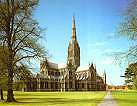The scene is a May evening, after dark,
on the West Green of The Close at Salisbury
Cathedral. The West front of the Cathedral
is illuminated in the background. Before
it is a shell-like concert platform
open to the audience. The English Chamber
Orchestra is obviously greatly augmented
to cope with the demands of the Saint-Saëns
Organ Symphony and the Grand
March from Aida. Alas neither
shine, both seem somewhat tepid in their
delivery; perhaps the sound is a little
swallowed up in an outside environment
or perhaps the ECO’s regular repertoire
is more restrained?
The concert opens with
the Finale of the Saint-Saëns symphony
with its strident declarations for two
pianos, its blaring brass fanfares and
the deep organ pedal chords. The very
inadequate booklet notes do not explain
the presence of the organ; one must
assume that it is the Cathedral organ
mixed into the sound texture through
some technical off-stage wizardry(?).
But the most bizarre element of this
excerpt is the contrived and restless,
vari-coloured lighting making the concert
shell resemble the mother ship from
Spielberg’s Close Encounters of the
Third Kind.
The cellist Ofra Harnoy
looking gorgeous in an emerald green
silk evening gown, shows off her impressive
virtuosity in the Rimsky Korsakov presto
show-piece, The Flight of the Bumble-Bee
before sparkling in the little known
but greatly appealing, melodic, gypsy-rhythmed
Hungarian Rhapsody by David Popper.
Charlton Heston makes
his first appearance reciting an American
poem, American Places,
a rather odd and somewhat tactless choice,
for it not only involves reeling off
a lot of odd-sounding American place
names but it also suggests that the
poet prefers them to English and French
places. Much more impressive is the
actor’s solemn and resounding declamation
of the Deuteronomy verses covering Moses
leading his people through the wilderness
over forty years until, ultimately,
he is commanded by the Lord to relinquish
his command so that Joshua might lead
the Israelites over the Jordan into
the Promised Land.
Heston has a bit part
as Westmoreland to Kenneth Branagh’s
magnificently animated speeches, stirringly
declaimed as Branagh strides across
the stage. The Cathedral’s façade
has giant spot-lit pictures of medieval
knights in battle. Composer Patrick
Doyle’s music for Henry V is
muted Walton and Vaughan Williams to
this reviewer’s ears. Doyle, himself,
impresses when he steps out in front
of the orchestra to lead the choir in
his setting of Non Nobis Domine
which concludes his film music suite.
The choir and orchestra,
feature in a rather tame rendering of
the Grand March from Verdi’s
Aida – they are rather upstaged
by the Kneller Hall trumpeters.
Placido Domingo in
strong voice is impassioned in both
the well-known Verdi and Puccini arias
and almost eclipses the late Mario Lanza’s
famous rendition on his last high note
of ‘Be My Love’. Jessye Norman’s glorious
tones – with lovely silken pianissimo
control – shine in the lovely Richard
Strauss orchestral songs.
The concert concludes,
appropriately, with colourful firework
starbursts above the Cathedral to Handel’s
music. This is followed by the choir
singing the Parry anthem to bring this
popular classical music event to an
end in true Last-Night-of-the-Proms
style.
I must stress the inadequacy
of the NVC notes There is no separate
booklet; the concert’s programme is
desultorily printed with no timings
and very little information on the inside
of the wrap-around case sleeve. There
are just the minimum of notes on the
back of the DVD case. There is no mention
of Salisbury Cathedral’s spire or its
history. Music DVDs are expensive enough
and this sort of mealy-mouthed presentation
is just not good enough.

For the record, the Cathedral City of
Salisbury is 90 miles south-west of
London. Building of the present Cathedral
- replacing an earlier structure on
higher ground slightly north of the
City - began in 1220 and was completed
with the construction of the magnificent
Tower and Spire in 1330. Salisbury Cathedral
is considered to be Britain’s finest
13th century cathedral, with
Britain’s tallest spire: 123m/404 ft
high.
Conservation has always
been key; and from 1945 to 1951 the
top 30 feet of the spire was rebuilt.
But in 1985 it was necessary to launch
a Spire Appeal to raise £6,500,000 for
repairs and conservation of the Spire,
Tower and West Front. In 1991, the year
of this concert, began the twenty year,
£20 million major repair programme partly
funded by English Heritage. In 2000
the repair and conservation of the Spire,
Tower and West Front were completed.
Elsewhere the Cathedral’s conservation
and repair programme continues … This
review was written in Salisbury, Wilshire,
England.
This ‘Pop’ classics
collection has its moments – all the
soloists shine – but the grander choral
and orchestral items seem oddly flat.
Ian Lace

